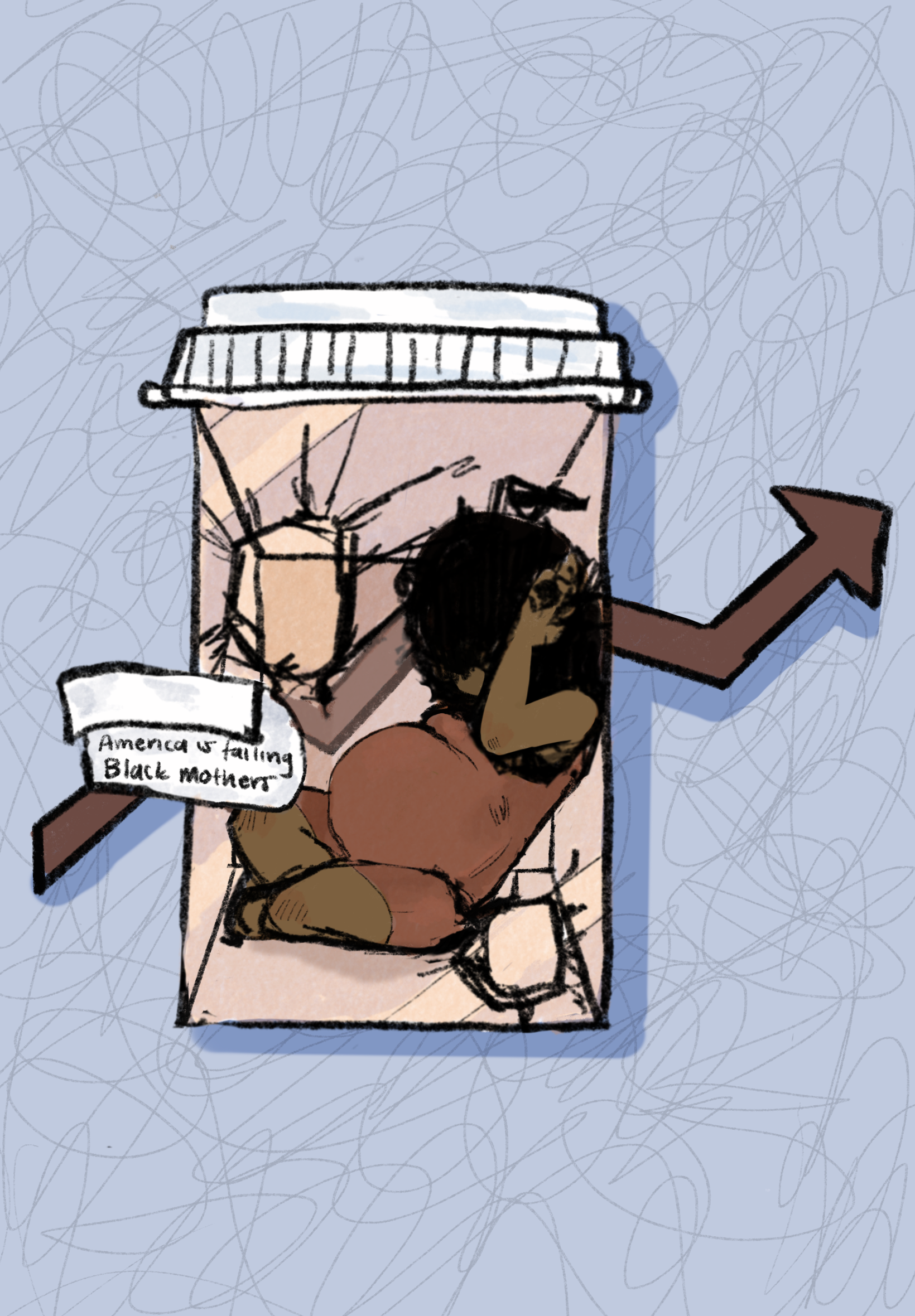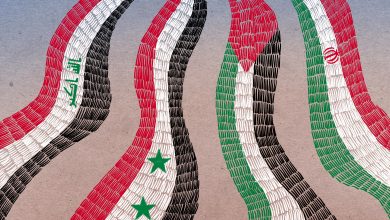America is Failing Black Mothers

Design by Ashley Luong
Image description: A pregnant Black mother sits inside a pill bottle clutching their hair. A note in front of the bottle reads, “America is failing Black mothers.” Going across the bottle, a stock vector arrow points up. There is a light blue background.
Disclaimer: I recognize that folks have diverse gender identities and strive to use gender-inclusive language when applicable. I also recognize that not all birthing folks may identify as a mother.
Pregnancy should be a time filled with joy and happiness; however, for many Black mothers, this is not the case. Black mothers are 3-4 times more likely to die from a pregnancy-related cause compared to white mothers. America must create structural health-orientated initiatives to protect Black mothers and birthing folks.
Additional studies have found that this widening maternal health gap is shared by all Black women regardless of income, education, or geographical location. Other social factors like age and marital status do not reduce the likelihood of Black mothers experiencing pregnancy-related complications or maternal mortality. A 2019 study found that the United States ranks last out of 30 industrialized countries with a maternal mortality rate of 20.1 deaths per 100,000 births. The rate for Black mothers is 44.0 deaths per 100,000 births. Studies have proven that hospitals do not keep Black women and Black birthing folks safe during pregnancy, childbirth, or postpartum.
The World Health Organization (WHO) defines maternal mortality as “the annual number of female deaths from any cause related to or aggravated by the pregnancy or its management (excluding accidental or incidental causes) during pregnancy and childbirth or within 42 days of termination of pregnancy, irrespective of the duration and site of the pregnancy.” While the causes of maternal fatalities vary from pregnancy-related complications such as hemorrhages during pregnancy to cardiovascular diseases, the well-being of Black mothers becomes more precarious by the day.
A recent study by Karen A. Scott defines the unique forms of racism against Black mothers and birthing people as obstetric racism. Through this study, Karen A. Scott found that Black birthing folks identified seven quality areas that impact their birthing experiences: safety, autonomy, communication, racism, empathy, humanity, and dignity. Another study by Kierra S Barnett and associates found additional themes such as lack of knowledge, mental health, communication with providers, support systems, and social determinants of health influence Black mothers’ experiences in health care before, during, and after pregnancy.
What’s causing such high rates of maternal mortality? Unfortunately, there is no clear-cut answer. From medical racism and obstetric racism to lack of access to adequate medical care, Black mothers face many barriers inhibiting a fair and safe pregnancy. For many Black mothers and birthing people, the hospital is ground zero for harm. Unfortunately, many aspects of Black folk’s birthing experiences are inundated with systemic racism and discrimination.
Invest in Maternal and Child Health.
One way America can address this problem is by making long-term investments in maternal and child health. In 2019, the total maternal morbidity costs for all U.S. births were estimated at $32.3 billion. The most expensive and most prevalent maternal health conditions are maternal mental health conditions ($18.1 billion), hypertensive disorders ($7.5 billion), gestational diabetes ($4.8 billion), and postpartum hemorrhages ($1.8 billion). This amounts to an additional $8,624 for parents.
The American healthcare system shouldered more than half the costs relating to maternal morbidity. Women spend 90% of their earned income on their families, while men spend only 30%-40%. Investments in women and children will manifest far beyond health outcomes and can lead to improved community resilience, strengthened social bonds, and increased economic prosperity.
Educate Ob-gynes and Other Relevant Medical Professionals on Reproductive Justice and Critical Race Pedagogy.
Reproductive justice activist and community scholar Loretta Ross and SisterSong (a reproductive justice advocacy organization) define reproductive justice (RJ) as “the right to have a child, the right not to have a child, and the right to raise your children.” This is a fundamental right that ALL mothers should have but unfortunately do not. RJ lies at the intersection of social, political, and economic inequalities that affect an individual’s right to bodily autonomy and access to reproductive health care services. Educating medical professionals on the significance of RJ will significantly increase equity and racial justice measures in healthcare. Reproductive justice recognizes Black and other marginalized people’s right to full body and political autonomy, and it is time the medical system does as well.
Use Community-Based Models of Care.
Doulas and midwives are great alternatives to traditional hospital births. Community-based doulas ensure mothers have strong relations rooted in trust and safety, effectively building rapport with mothers throughout the pregnancy, delivery, and postpartum period. Doulas are trained to provide psychosocial, emotional, and educational support during these three periods. They also serve as patient advocates and assist during labor and delivery, providing comfort and support to mothers. According to an NIH study, Black mothers who utilize doula services are two times less likely to experience a birth complication and four times less likely to have a low birth weight baby. They are also more likely to breastfeed and feel satisfied with their care.
Another community-centered model of care involves midwives. Midwives oversee the full spectrum of maternity care and provide reproductive health and birth support to expecting mothers. Research shows that midwife-led maternity care results in lower preterm births and low birth weight infants compared to traditional maternity models.
Ultimately, the American medical system is not safe for Black mothers. America needs to invest in community models of care, such as doulas and midwives, as an alternative to traditional hospital births. Black mothers deserve a space where they feel respected, cared for, listened to, and valued as they embark on their journey of motherhood. Black mothers need culturally competent medical professionals who understand the unique challenges Black mothers and birthing folks face.
Furthermore, reproductive justice measures must become a staple of the medical curriculum. Reproductive justice affirms that all parents deserve the right to have children and raise them in safe and healthy environments. While the 2021 Black Maternal Health Momnibus Act is a step in the right direction, it is not enough. The legislation consists of 12 bills that provide funding to community-based organizations, improve data collection processes and research efforts, and invest in programs that will mitigate the effect of social determinants of health.
However, America can do more. Child and family health is woefully underfunded and under-researched. Hopefully, these measures will start a much-needed reimagining of child, maternal, and family health efforts. Indeed, parents deserve the right to have a safe and secure birthing environment and access to resources and social support that will ensure the best outcome for the expecting family and their child. America must invest in alternate models of care that are community oriented and put mothers first.



